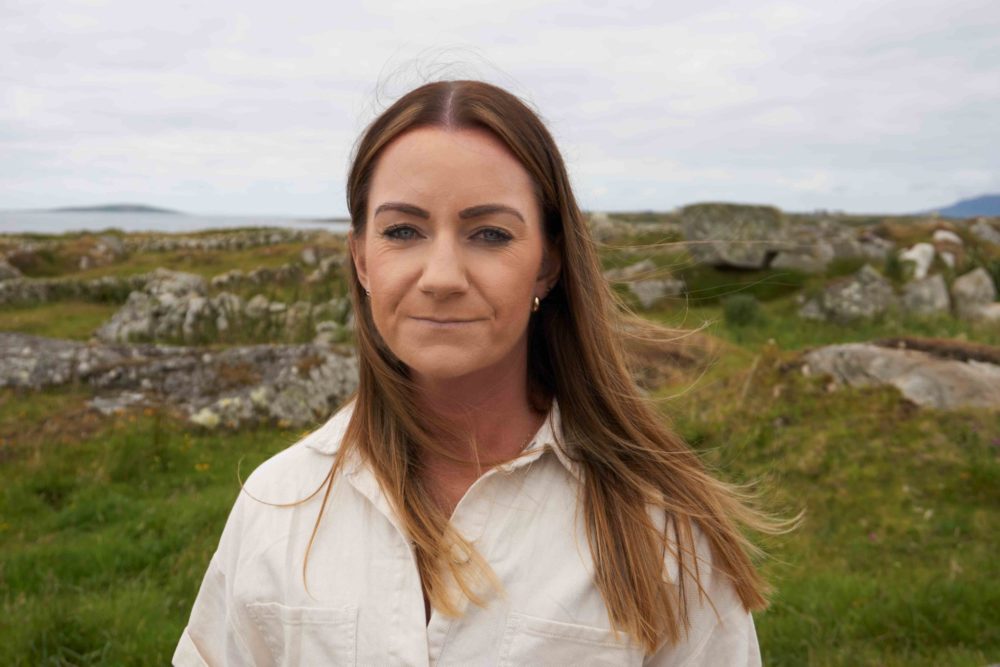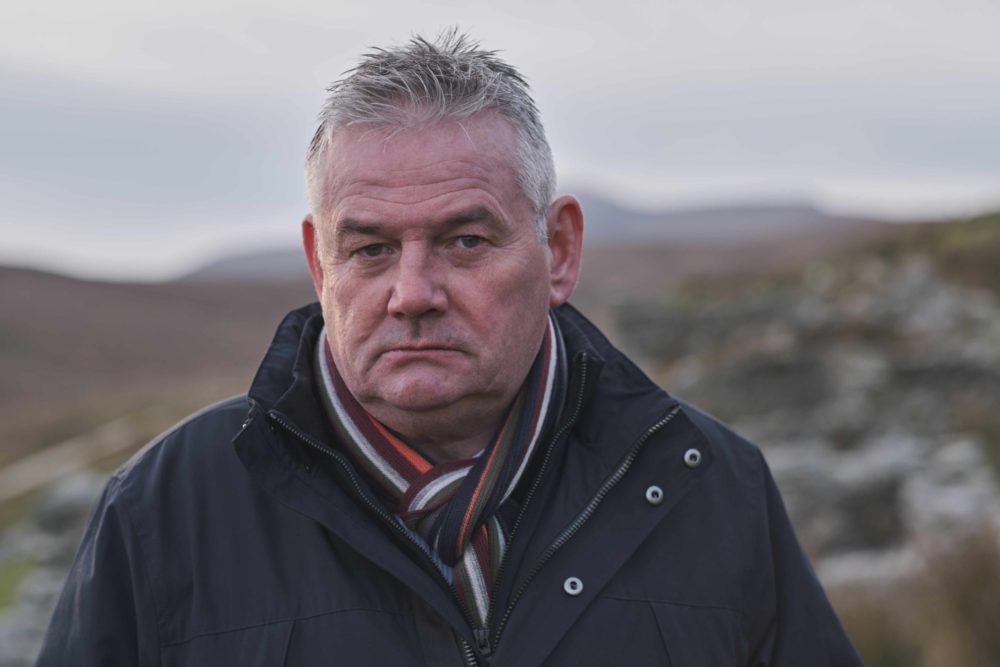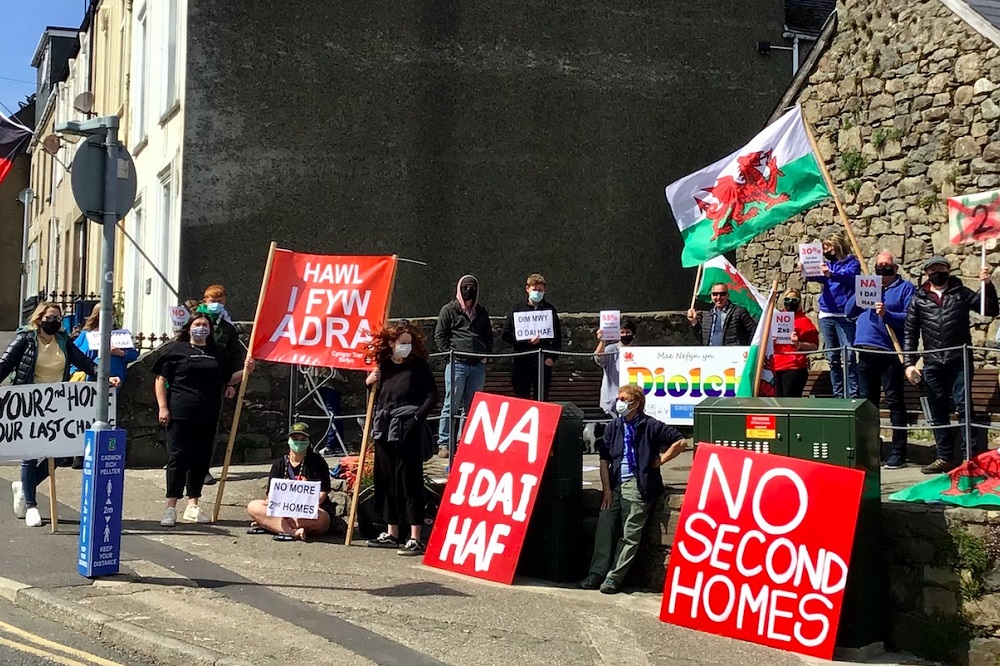Irish documentary heads to Wales amid Airbnb and rental crisis

An Irish documentary which examines the impact of the housing crisis in Irish speaking heartlands, where 1,000 houses are currently listed on Airbnb, will head to Wales in its next episode.
Tomorrow night on TG4, investigative current affairs series Iniúchadh TG4 examines the housing crisis in the Gaeltacht (the regions in Ireland where the Irish language is or was the primary language of the majority of the population).
The programme ‘Níl Aon Tinteán’ presented by investigative journalist Kevin Magee More reveals that more than 1,000 houses were listed on Airbnb for short term let in Ireland’s Gaeltacht regions this summer, but less than ten houses were available for long-term rental.
The documentary ‘Níl Aon Tintéan’ examines the impact of the housing crisis in Ireland’s Irish speaking regions.
The increase in the number of short-term lets and the proliferation of holiday homes has led to a shortage of long-term rental accommodation in the Gaeltacht, which is forcing locals to seek accommodation elsewhere.
A sample of Airbnbs and rental properties taken in a random week in August this year showed that there were 1017 houses listed on Airbnb for short-term rent in Ireland’s Gaeltacht compared to only 10 houses available for long-term rent which were listed on the rental website Daft.ie.
Loss
In terms of a regional breakdown of the period Co. Kerry’ Gaeltacht regions had the highest number of short-term lets available at 543, but not a single house listed on Daft.ie for long-term rent. In Donegal’s Gaeltacht there were 225 houses listed on Airbnb while only three houses appeared in the same region on Daft.ie available for long term rent. The Connemara Gaeltacht had 221 Airbnbs available and only four houses available for long-term rent.
In smaller Gaeltacht areas, Múscraí in Cork had 10 Airbnb listings, but no long-term rentals were listed on Daft.ie. An Rinn, in Co. Waterford had 15 Airbnb listings with two houses available for long -term rent on the Daft.ie site.
According to the Connemara-based activist and commentator Donncha Ó hÉallaithe, people living in the Gaeltacht are being forced out of the local housing market because of the demand from outsiders for second homes that often double as Airbnbs. Speaking in Irish, he said: “There are problems when houses come on the market here, because it’s an open market. Because there is a housing problem all over the country, people are coming from other places and are buying these houses as a second home or as a holiday home or a home to retire in and so on. So that’s pushing locals out of the market.”
As a result of the lack of suitable long-term rental accommodation, people who want to raise families in the Gaeltacht are being forced to move and live elsewhere he said. “Most of the houses available are on Airbnb. They are not available for people who want to rent long-term. People aren’t staying here anymore, they are leaving and when they go, there aren’t strong Irish-language communities in the places they go to and that is a loss for the Irish language and Gaeltacht communities.”
“It is sad”
Kevin Magee travelled from one Gaeltacht region to another, he heard similar stories from young people who can’t get planning permission or find a suitable place to live in the Gaeltacht.

Máire Eibhlín Ní Chlochartaigh, a native of Mainís in the Conamara Láir Gaeltacht, wanted to settle there. It is an area that is being promoted by the Government development agency, Údarás na Gaeltachta, as one of the best places in the world to live and work.
However, Máire Eibhlín was refused permission to build a home on family land and has to move from the Gaeltacht to find somewhere else to live as a result.
She said: “Our planning application was rejected because we were told the site was not suitable, we were also told that a house on the site would interfere with the local landscape. It really broke my heart. I shed tears, my heart was broken. It is sad. I hoped that I would have children here one day and that we would give them the same opportunities as I had.
“The amount of money we spent and lost on the planning process, we lost our confidence, and we made the decision last year to give up on it. We saw a site in another county, and we are going to buy that instead.”
Research carried out by Dr. Séin Ó Muineacháin for Údarás na Gaeltachta shows that on average almost a fifth of homes in the Gaeltacht are holiday homes with the proportion increasing in some Gaeltacht areas.
When we look at the housing supply in the Gaeltacht, what stands out is that almost one fifth of those houses are only used as holiday homes. Almost 20% of the housing supply in those areas are made available for rent on the likes of Airbnb, available for short-term rental for tourists who are coming into the area.
When broken down area by area, the figure is higher than 20% in many Gaeltacht areas. 45% of homes in the South Kerry Gaeltacht are classified as holiday homes. In the north Donegal Gaeltacht, the figure is 42%. In the West Mayo Gaeltacht, 34% are holiday homes. In Conamara Láir the figure is 19% and in Na Déise it is 12%. In Ceantar na nOileán and An Cheathrú Rua in the Conamara Gaeltacht, 10% of houses are holiday homes, according to the analysis carried out by Dr Séin Ó Muineacháin.
Cymru
Kevin Magee travels to Wales to look at how Gwynedd Council has dealt with the problem of short-term lets that make it difficult for Welsh speakers to afford homes in Welsh speaking areas. “The biggest problem is that young people can’t afford to live in their own communities. As a result, they have to go and live in England and they are no longer living their lives in Wales and not speaking Welsh, and bringing their children up to speak Welsh,” said Beca Roberts, Plaid Cymru chair of Gwynedd council.

Second homeowners in Gwynedd already pay more council tax than permanent residents, and from this month, anyone who buys a house in Gwynedd and wants to change it into a second home or an Airbnb will have to get planning approval from the council.
“People are starting to think twice before buying a second home or an Airbnb. We have seen houses come onto the market as a result,” she said.
Iniúchadh TG4 – Níl Aon Tinteán airs on Wednesday 11 September at 9:30pm on TG4 & TG4.ie
Support our Nation today
For the price of a cup of coffee a month you can help us create an independent, not-for-profit, national news service for the people of Wales, by the people of Wales.






Most people need to rent their first home, a safe option before deciding where they want to be based long term and then make the long term commitment of buying.
The ongoing Welsh Assembly legislation is decimating not only the rental housing supply, but with so many owners selling rental properties it’s now also damaging the intent of developers to build new properties.
For a start it’s not the Welsh Assembly, it’s been known as the Senedd for over four years now! Secondly, the Welsh Government, albeit slowly, is beginning to tackle the issue of badly needed social housing. The fortunes and prospects of speculative builders isn’t something to shed tears over. If the owners are selling their rental properties, that is all to the good, especially if that property is going on to provide homes for local people. There is, and has always been sufficient housing in the area under question, it’s just that far too much of it is, and remains… Read more »
Common default for me is to revert to Assembly (of delusional decision makers) when they mess something up. I actually prefer Senedd, but it does need some people from the real world. As always it’s a matter of balance to sustain the local tourist economy and even new build properties are sometimes required. Skewing the regulations too far one way has decimated the long term rental market, even in areas where there is little STL – just 150 renters after a house despite the rent doubling. Developing an economy does require people who develop property, if they decide to literally… Read more »
“The biggest problem is that young people can’t afford to live in their own communities. As a result, they have to go and live in England and they are no longer living their lives in Wales and not speaking Welsh, and bringing their children up to speak Welsh,” said Beca Roberts, Plaid Cymru chair of Gwynedd council. One of the main reasons why we are still having this conversation is due to successive governments attacking the private rental sector. Any increased cost placed on the landlord will be passed on to the renter thus making their rents higher. Well done shelter… Read more »
Kids grow up and then leave home and move to a different part of the UK, its being going on forever. I don’t think its your right to be able to live and afford a house near where you parent lived, ask someone from lake district.
Some Welsh Patriot you are with that way of thinking! Why on earth should locals not have a right to live in the communities they grew up in?
Padi, its not about patriotism, is about realism.
Are you really saying is a God given right for kids to live in the same community they were born in regardless of how expensive that community now is? swap West Wales with Chelsea and complain to Chelsea Council you can’t afford the house prices around there! I know what they would tell you, go and live in a cheaper borough.
The private rental sector should be abolished completely and in its place socially owned housing be developed. Your arguments are not founded on anything but your own flawed belief. The private rental sector is about one thing, and one thing only, profit. So no, no decision by any local authority was behind the decision of private landlords to seek even more profit from short term holiday rentals over providing long term rental to local people. Let’s not delude ourselves that the vile predicament we find ourselves in over homes for the people of Wales is anything other than one of… Read more »
‘The private rental sector should be abolished completely and in its place socially owned housing be developed’. Ideological and will never happen. What could happen is more prominence of institutional landlords such as Blackstone, John Lewis, Legal & General and Grainger as smaller landlords leave the market. Concerning the latter lets look at a quote from its 2022 annual report. ‘Despite the growth in the sector of late, build-to-rent landlords still only represent c.1.5% of the market, providing a significant structural opportunity as the market shifts away from small, private landlords to build-to-rent, large-scale professional landlords, such as Grainger. This… Read more »
Padi Phillips “The private rental sector should be abolished completely and in its place socially owned housing be developed”.
Balanced argument goes out of the window in sentence one! This flawed belief can be confirmed by driving through many council estates.
You will though stop dead the local holiday let market, any tourist travelling though many council estates in this country will make a u-turn and never come back.
The second home industry across Wales has to be put to an end, it is an industry which makes a profit by destroying Welsh communities and turning them into holiday parks. The incoming legislation such as article 4 by Cyngor Gwynedd needs to come with investment and promotion of small scale industry in these rural communities in order to ensure that young Welsh people do not have to move away for work and are able to remain in these Welsh speaking communities. Young people don’t want to work in the tourism industry, its good for when you’re 14 but no… Read more »
‘However, Máire Eibhlín was refused permission to build a home on family land and has to move from the Gaeltacht to find somewhere else to live as a result.’ This isn’t just an Irish phenomenon. Back last year I recall watching a TV interview with a young woman who’d grown up in Dyffryn Aeron, had employment there, and who wanted to remain in the community in which she’d grown up. She was planning to get married, and as property prices in the area were beyond her own and her fiance’s means, her family had offered them a plot on their… Read more »